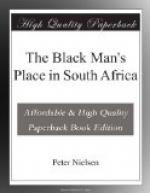Recent study has indeed dissipated that fascinating idyl about the old race of tall, blond Aryans as the originators of our present civilisation, for it has been shown that the so-called Aryan civilisation was inferior in many ways to the primitive culture of neolithic times, and it can now hardly be doubted that our classical civilisation is of Mediterranean origin though Aryanised in speech. It is now generally accepted that history points not to Scandinavia and Germany, but to the lands lying round the Mediterranean Sea as furnishing the matrix out of which civilisation has sprung. It is to the South rather than to the North, to the early people of Egypt, Palestine, Greece and Rome, and not to the primitive inhabitants of Scandinavia and Germany, that we must look for those great men whose intellect and character were strong enough to overcome the natural conservatism of their times. The mind of the early white men of the North never soared higher than a valhalla peopled with puerile deities and blood-stained warriors whereas the swarthy thinkers of the South discovered the unseen God, invented art and philosophy and developed law and government. And though the Church proclaims the highest of all born leaders, Christ himself, to be the very son of God, yet was he a native of Palestine and not a fair-haired, blue-eyed Teuton as represented by mediaeval painters of Germany and Holland.
It is no doubt true that the invaders and the immigrants have often achieved more in their new surroundings than in their homelands, as the Moors in Spain and the Irish in America, but it must not be forgotten that the civilisation which the new-comers have enriched by virtue of their new found freedom from home conservatism has not been of their making; they may have added thereto but they did not beget it; the spade-work, which is the hardest part, had been done before they arrived.
Looking, round the world to-day we see clearly that race is not the determining factor in contemporary progress. In Japan we see a people, admittedly not white, who until yesterday were stagnating under a system of childish feudalism, now developing at a great pace a culture similar with and not inferior to that of modern Europe, while in Western Ireland we see white people living in a state of sloth and squalor below that of many “raw” Bantu tribes in South Africa. These facts show that any race, white black, or yellow, may be kept down simply by the forces of conservatism, chief among which is priestcraft operating through prejudice and superstition in the name of religion. To say this is not to cavil at the priests of any particular time or creed. We must have priests as well as prophets. The prophet of a new faith begins his mission by breaking the images of the priests before him and is succeeded by his own priests who set up new images and dogmas wherewith to conserve the new-found creed until it in turn becomes too old when, in the never-ceasing




